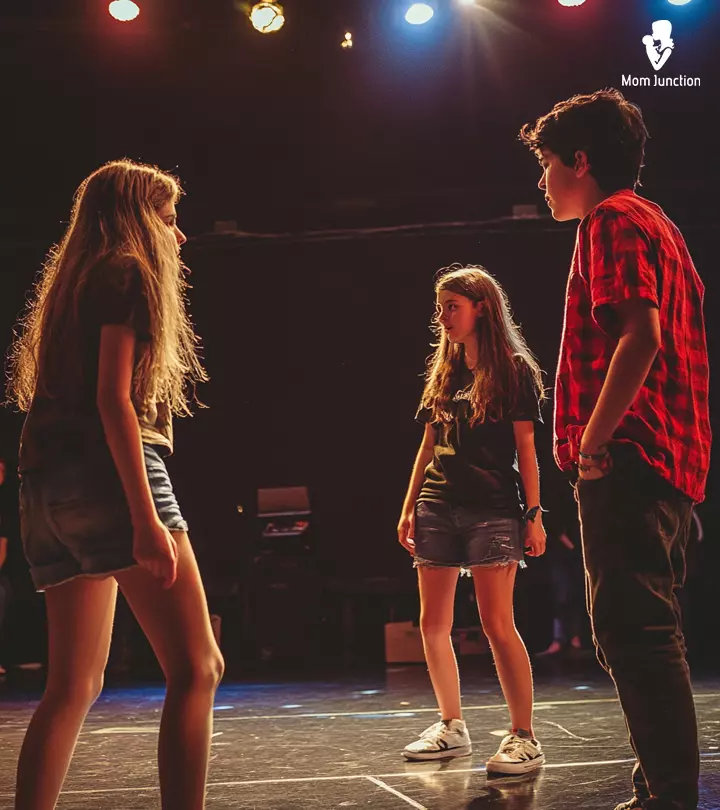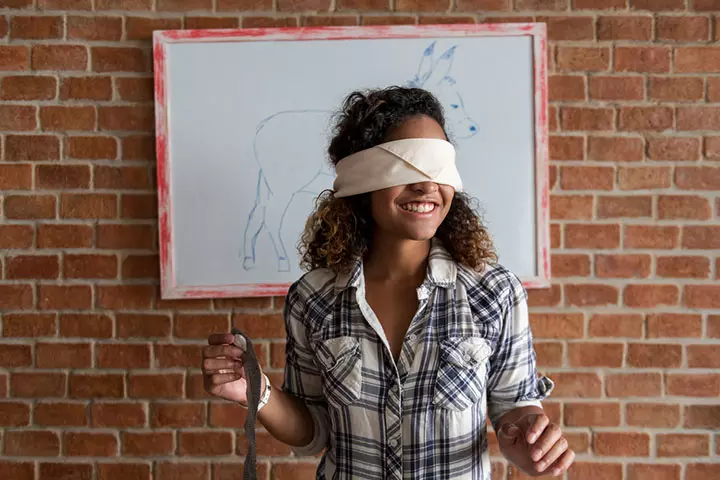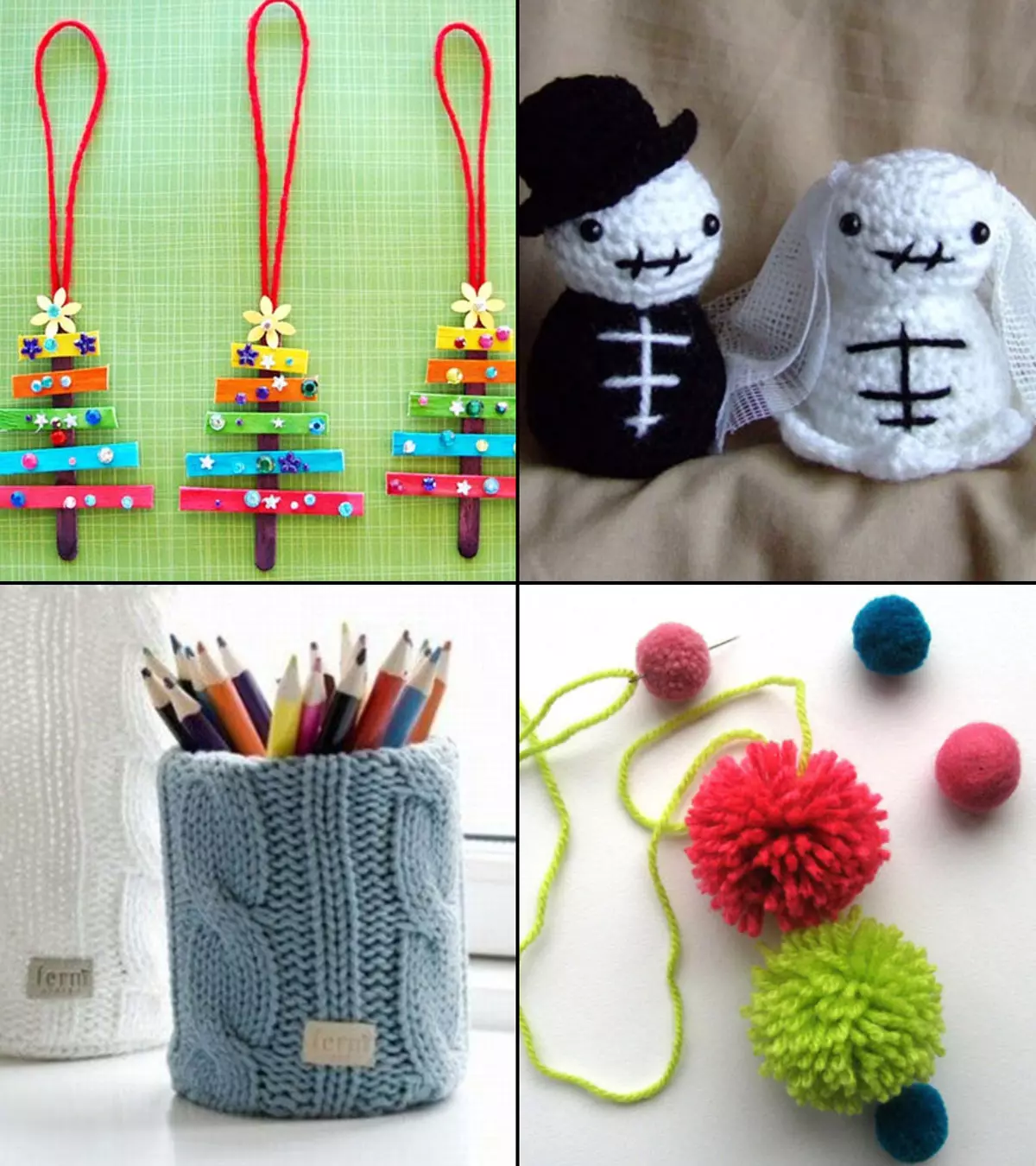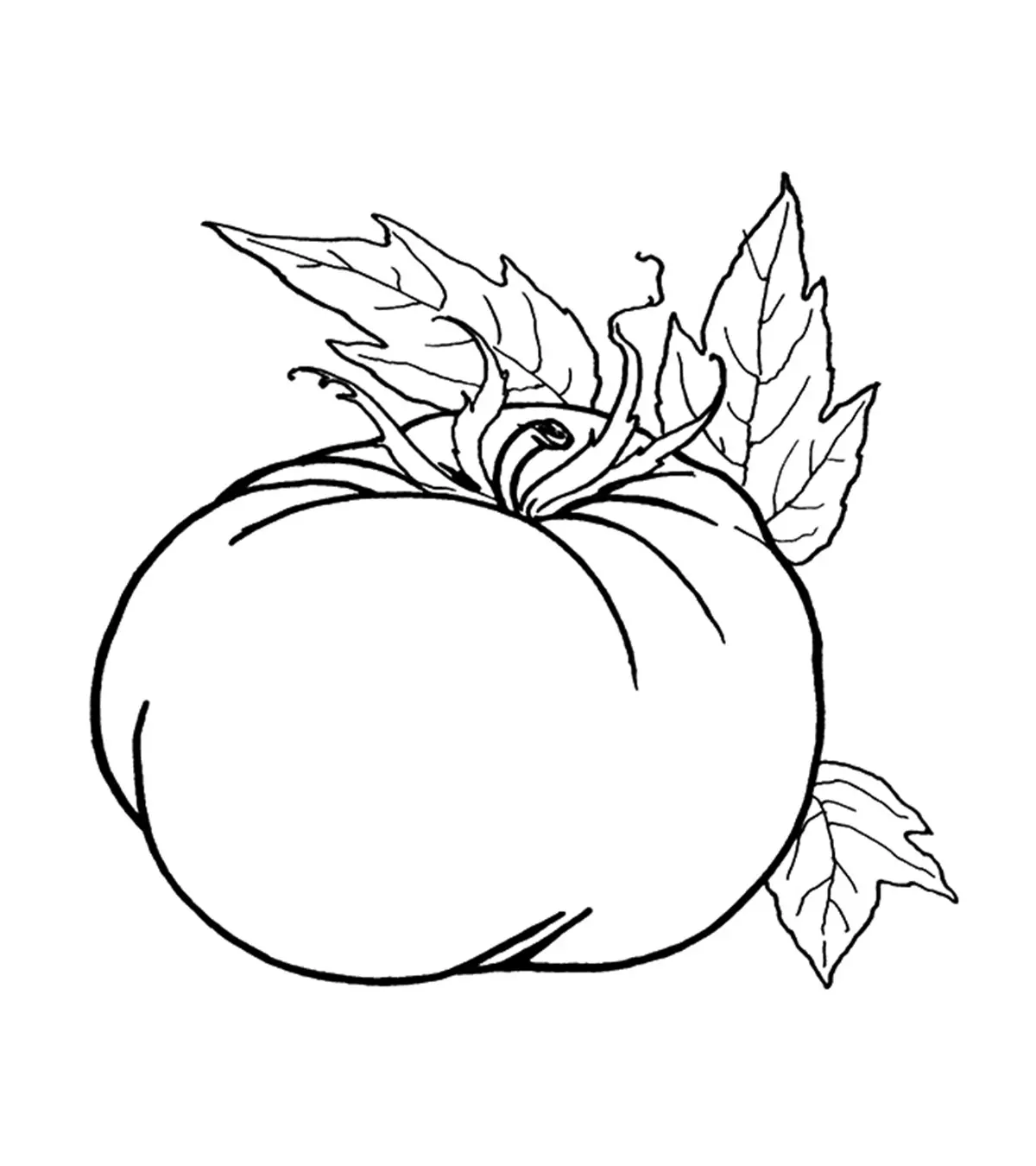
Image: Midjourney/ MomJunction Design Team
If your teen is shy or has difficulty making friends, improv games for teens can help them come out of their shells. These games can be a great way to help them open up and express themselves better. They will help them mingle with other children more easily. Moreover, active and energetic teens can channel their energy into these drama games while exploring their creativity. So, here’s our list of some fun and interesting improv games. Read on to know more.
Key Pointers
- Improv games can help shy and introverted children open up and express themselves more comfortably.
- These games also benefit extroverted teens as they can channel their energy into creative activities.
- Games such as Counting Up And Down and Shake Up The Sequence help improve children’s concentration and focus.
- Games such as Only A Word and Story Cubes help boost their imagination and hone their storytelling skills.
- Walk With Me and Freeze And Justify are games that help teens build social skills.
Drama Games For Teens
1. Count the one, two, threes
Let your teen pair up with a partner for this fun game. It is an absorbing way to improve concentration and hone one’s multi-tasking abilities.
- First, ask your teen to stand facing the partner and keep counting one, two, three over and over again.
- Once the pair can do so comfortably, ask them to clap their hands instead of saying ‘one.’ They will still have to say two and three out loud. So the pattern will be a clap, followed by saying two, three out loud.
- Once the pair can do this step, they have to exchange the word ‘three’ for the act of bending their knees. So, the pattern will be a clap, say the word ‘two’ out loud, and then bend the knees. It has to continue like this over and over again.
- Once your teens can master these movements and do them properly, ask them to create their own steps and incorporate the same.
2. The truth and lie hide and seek

The aim of this drama game is to try and improvise facial expressions. Your teens will have to master the art of convincing and maintaining their expressions, whether they are lying or are being truthful.
- If there are many teens around, they can all sit down in a circle to play the game. In case there are not too many teens, you can divide them up into pairs and ask them to sit facing each other.
- For the game, each teen has to start by introducing himself with three lines about self. The teens will have to say two true things about themselves, but one lie to the audience. While doing so, your teen will have to try and keep the expressions as calm and natural as possible, so that the other teens are not able to spot the lie.
- The other teens who are listening to the introduction will have to try and read the facial expressions and detect the lie. Once a teen gets caught, he steps out of the game, while the teen who found the lie wins a point.
- The teens can also play this as a group challenge, where one team will be the spotters and the other team has to lie. The teens in the lying group can choose who will tell the lie. Once ready, the teens in the lying group can introduce themselves with one sentence each. While all the teens in the group will tell the truth, only one teen will lie. The other group has to try and spot out who is lying. You can keep reversing the groups into the lying and the spotting teams for each round.
 Point to consider
Point to consider3. Pass the energy
Pass the Motion is an engaging activity that helps teens improve their focus and teamwork while having fun.
- Teens gather in a circle, ensuring everyone can see each other.
- The leader explains that the group will pass energy around the circle using claps.
- The leader demonstrates with the person next to them by making eye contact and clapping simultaneously, establishing the initial rhythm.
- Teens pass the clap to the next person in the circle. Each person turns to the person next to them, makes eye contact, and claps together, maintaining the established rhythm. The clap continues in the same direction around the circle.
- Once the group has mastered the single clap, the leader introduces the concept of the double clap. Teens learn that if someone claps twice, the clap changes direction.
4. Catching the name
are a fun way to introduce your teen to new friends, break the ice, or just throw a challenge game amongst friends. An activity such as Catching the Name has an added benefit: it helps build concentration and memory.
- Let your teen and friends sit in a circle. For the game, your teen can use a ball or a throw pillow.
- The teen with the ball or the pillow has to throw it at random at any other teen in the circle. While doing so, the teen who is throwing the ball will have to say his name out loud. For instance, if your teen is throwing the ball while doing so he will have to say “Hi I’m so and so.” Make sure that your teen is looking at the other teen while saying his name. Once the other teen receives the ball, he has to throw it to another teen while saying his name.
- First, let all the teens get comfortable with each other and be able to practice this over and over again.
- Once they can do so, take the game to the next level. Now when your teen throws the ball, instead of just introducing himself, he will have to say his name and the name of the person he is throwing the ball to. For instance, he has to say something such as “so and so is throwing at so and so.” Keep repeating the game till all the teens are comfortable and can say it.
- For the next stage, the teen who throws the ball has to fold his arms in front of him to signal that he has already played. As the tempo of the game builds up, the teen who throws the ball has to be careful and not throw the ball at any teen whose hands are folded. While concentrating on the folded hands, the teens will also have to remember to say the right sentences.
5. Dubbing
Dubbing can help teens express themselves better and have fun while being creative.
- Teens watch a movie in a foreign language without reading subtitles.
- As the film plays, each participant improvises and creates imaginary dialogue, matching the scene.
- They can also act out the scenes and modulate their voice to make them more interesting and funny.
6. Try not to laugh
This game not only provides lots of laughter but also helps teens enhance their self-control.
- Teens start by choosing one person to be the invisible player. They should act as if the player is truly invisible.
- Teens must not interact directly with the invisible player.
- The invisible player needs to try to make the others laugh using funny actions without directly touching or interacting with them.
- Any teen who laughs must leave the game.
- The game continues until only one player remains who has not laughed. This player is the winner.
7. Counting up and down
Here is another fun drama game for teenagers that will help them to improve his concentration as well as hone his patience skills.
- Let the teens sit down together and form a circle. The idea is that the teens will have to do a count up and a countdown, without any particular order of person. For instance, one teen starts the game by saying out the word ‘one’ and any other teen in the circle can say the next number.
- The teens have to be extremely alert and ready so that they can say out the numbers in sequence.
- It is not allowed to repeat a number during the same round, for instance, if a teen says the number ‘four’ the other teen cannot say the same again, as it will lead to a negative marking. The teens have to concentrate on the numbers that are being said and also use their patience to take their turn properly.
8. Taxi cab
Taxi Cab is a fun improv game that helps teens improve their creativity while encouraging quick thinking and teamwork.
- Teens set up four chairs in two rows of two to resemble a car.
- Teens are divided into groups of four. One teen acts as the driver and starts the scene by creating a unique character.
- The first teen (driver) begins the scene, portraying their character.
- The second teen gets ‘picked up’ and introduces a new character, such as someone who just got their hand fractured.
- The driver must immediately take on the character traits of the second teen, so now both are acting as if they just got their hand fractured.
- The third teen gets picked up and brings in a new character. All previous characters, including the driver and the second teen, must adopt this new character’s traits.
- The fourth teen gets picked up, and the same process repeats, with everyone in the car taking on the fourth teen’s character.
- After a minute or two of interaction and comedy, the fourth teen gets out of the cab. The remaining teens revert to the third teen’s character.
- This process continues with each person exiting the cab and the remaining teens reverting to the previous character until only the driver is left.
- The driver ends the scene by returning to their original character.
9. Job interview
Job Interview is an excellent improv game for teens, helping them prepare for real-life job interviews.
- Teens select one player to be the interviewee. This player leaves the room.
- Teens remaining in the room decide on a specific job for the interview.
- Teens call the interviewee back into the room and place them in the hot seat.
- Teens take turns asking the interviewee a range of interview questions specific to the chosen job. The interviewee must answer without knowing what the job is.
- The interviewee uses context clues from the questions to guess the job while responding.
- After a few questions, teens ask the interviewee to guess what job they are being interviewed for.
- Teens reveal the job if the interviewee guesses incorrectly.
- Repeat the process with a new interviewee, allowing multiple teens to participate in both roles.
10. What are you doing

In this fun acting game, your teen will have to keep his focus on high alert and put his fast-thinking skills to use.
- One teen has to take center stage and perform an act of doing something, without saying anything out loud. You can let all the other teens stand in a queue or sit in a circle.
- Now one teen gets up and asks the teen what he is doing. He has to answer anything else other than what he is doing. For instance, if he is performing the action of dancing, he will have to say something else, such as “I am brushing my teeth.”
- The teen who asked the performer “What are you doing” will have to start immediately acting on the action that the other teen said, in this case, “I am brushing my teeth.”
- Now another teen will come up and ask “What are you doing” and the game continues till everyone gets a chance to perform.
11. Shake up the sequence
This fun game will help your teen warm up and get ready for a performance or just for fun.
- All the teens have to stand up and together count out from one to ten. While saying out each number, they have to shake their right arm. Next, they have to count down from ten to one and shake their left arm.
- Once they have finished the sequence, they have to start counting again from one till nine and shake the right leg. Next, they have to count down nine to one and shake their left leg.
- Keep changing the sequence like this till the teens are left with counting only from zero to one and back.
12. Excuses

Excuses is a fun improv game that can enhance teens’ communication skills and imagination.
- Teens stand or sit in a circle where everyone can see and hear each other clearly.
- One teen starts the game by making a simple accusation, such as “Why didn’t you do your homework?” or “Why were you late to practice?”
- The accused teen must immediately come up with an excuse. The excuse should be creative, fun, and plausible. For example, “I couldn’t do my homework because my dog ate my textbook,” or “I was late to practice because I got stuck in a time loop.”
- Other teens can jump in to confirm and embellish the story. For instance, one might say, “I saw it! The dog really was chewing on the textbook,” or “I was there too! We were both stuck in the time loop.”
- Teens take turns making accusations and providing excuses, with different players being accused each round.
13. Shake up a storm
The game will help teens modulate their voices.
- Let all teens stand up on one side of the room and one teen takes on the role of the conductor. The conductor has to move his arms up or down, showing how to build up the crescendo.
- The teens will have to concentrate on the driver’s movement and modulate their voice accordingly. In this way, the storm will build up and subside and build up and down again. Add actions such as stomping feet for thunder, rubbing hands together for breeze and so on..
14. The voice over

Here is another game that will help your teen practice expressions through voice.
- Blindfold one teen at a time and let all the teens stand in a queue. Now one teen goes over to the blindfolded teen, disguises his voice and his tone and says something such as “who am I?”
- The blindfolded teen has to guess the teen’s name correctly. If the answer is right, the blindfold passes on and so on. Make sure all the teens have a turn at being blindfolded and at disguising their voice.
15. Walk with me
This game will teach your teen to follow cues without being told and how to read body language.
- Let all the teens stand around the room and start walking on a given signal. Make sure they walk all over the room and use up all available space. At another given signal, all the teens have to stop and freeze wherever they are.
- Let them practice till they get the hang of it. Next, the teens will have to do the same thing but without being given a signal. They will have to read each other’s body language and start walking as a group, and stop at the same time as well.
Super Fun Improv Games For Teens

16. Imitation
Imitation is a fun and engaging game that helps teens develop their observation skills and fosters creativity. It is an excellent activity for bonding and laughter.
- One teen starts by performing an action or making a sound. It can be something simple like snapping fingers, clapping hands, or making a funny noise like a chicken clucking or whistling a short tune.
- The next teen in the circle will imitate the action or sound as accurately as possible.
- Each teen, in turn, will imitate the person before them, creating a chain of imitation around the circle.
- As the imitation progresses, the actions or sounds may become distorted, leading to amusing variations.
- Teens should try to make their actions or sounds goofy and exaggerated to increase the fun and challenge of accurate imitation.
- Continue the game until everyone has had a chance to start an action.
17. Message chain

This game encourages creativity and highlights the importance of clear communication.
- Teens stand in a line, all facing the same direction.
- The last person in line becomes the lead. This person writes down an action, such as “I was trying to catch a butterfly and fell into a pond,”
- Teens next to the lead act out the written action without any verbal cues. They must use gestures and body language to convey the activity.
- Each teen in line observes the person before them and then repeats the action to the next person in line without speaking.
- The first person at the beginning of the line watches the last performance and guesses what the original action was.
- The lead reveals the original action, and everyone compares it to the final guess to see how accurately the action was communicated down the line.
18. Alphabet story
Some group activities for teenagers are not just fun but also make for wonderful opportunities to use their imagination. Alphabet story is one such creative storytelling game that enhances teens’ communication while encouraging creativity.
- Teens can create a story together, with each sentence starting with the next letter of the alphabet. For example, the first sentence starts with ‘A,’ the second with ‘B,’ and so on.
- The first teen begins the story with a sentence starting with the letter ‘A.’ For example, ‘A giant dragon lived in the mystical forest.’
- The next teen continues the story with a sentence starting with the letter ‘B.’ For instance, “But the dragon was not an ordinary dragon.”
- They take turns adding sentences to the story, each starting with the subsequent letter of the alphabet.
- They need to make sure the story makes sense and flows smoothly while following the order of the alphabet.
- Once the story reaches the letter ‘Z,’ or when it naturally concludes, the game ends with everyone enjoying the hilarious plot they created together.
19. The no sense dictionary
Here is a fun improv game that will help your teens concentrate on what others are saying, and come up with a made up answer to that in an instant.
- Let the teens sit down in a circle. One teen starts by saying a word. The teen sitting next has to come up with any word randomly, which does not have to be connected to the first word.
- For instance, the first teen says the word ‘spaghetti’ and the second teen says the word ‘book.’ The third teen has to immediately come up with a definition sort of statement which will have to include the two words mentioned earlier. The teen can come up with anything, as long as it is fun and creative. A fun sentence could be something such as “The spaghetti has recently been declared as one of the most delicious forms of bookmark that any book lover could use, especially while reading during a meal.”
- To make it fun, you can also change the order and pick any two people at random to say the words and a third random person to come up with the definition.
20. Last word, first word
Last Word, First Word is an enjoyable and interactive improv game that challenges teens to think on their feet and collaborate with their peers.
- Gather the participants in a circle.
- One teen begins the game by saying a sentence aloud. For example, “The dog jumped over the wall.”
- The next teen must start their sentence using the last word of the previous sentence. For instance, if the previous sentence ended with “wall,” the next sentence should also begin with “wall.”
- The game will continue in this manner, with each teen using the last word of the previous sentence to start their own. Everyone should be quick and keep the sentences flowing.
21. Octopus

This game not only brings lots of laughs but also encourages teens to develop their problem-solving and communication skills.
- Teens start by standing in a circle or a line, each player holding hands with the person next to them.
- Teens move around while holding hands, creating a tangle of people as they move.
- The challenge is for teens to untangle themselves without letting go of each other’s hands.
- The process of untangling will likely evoke laughter and joy.
22. Crazy 8s
Crazy 8s is a lively and engaging game that challenges teens to coordinate their movements. It provides a fun and energizing way for teens to bond and enjoy each other’s company.
- Teens gather in a circle, ensuring everyone has enough space to move around comfortably.
- On the count of three, everyone lifts their right hand, shakes it quickly, and collectively counts to eight. They repeat this action with their left hand, right foot, and then left foot.
- After completing the first round, the players repeat the routine, but this time they only count up to seven for each movement. This pattern continues in subsequent rounds, with the count decreasing by one each time.
- The game continues until everyone is rapidly waving their entire body and shouting one!
23. Act-ionary

Here is a game that is not just an extension of dumb charades, but is a great way to help your teen express and emote.
- Divide up the teens into different groups depending on the number of teens that are there. One teen will have to help lead the game, so count out one teen from the groups.
- Hand out a sheet of paper and pen to each group and ask them to come up with a list of words, expressions, and such that have to be acted out. Try to keep them as expression-oriented as possible.
- Make sure that the teens write their team names on the paper, such as team A, team B or anything that can distinguish them apart.
- The teen who will help to lead the game will take the lists and make sure that he hands the opponent team’s list to the player who comes up to act. The player will see the word and then go back to his team and emote, without saying anything. The players have to guess the right emotion, expression or word that is mentioned in the list.
Benjamin Lloyd, a blogger and the owner of a performing arts studio in Pennsylvania, shares an interesting structured improvisation technique he uses for his theater group, including differently-abled students. He explains, “We create these scenarios using ‘structured improvisation’ in which we design a simple three-act story based on our client’s needs, and our actors rehearse and perform it like it’s a little play. Except it isn’t because there’s no script.
“With this technique, everyone in the class can participate to their full potential… Our students are gaining confidence, developing verbal skills, acquiring emotional intelligence, and learning basic narrative structure: beginning, middle, end (i).”
24. Genre switch
Genre Switch is an engaging and entertaining improv game that empowers teens to think creatively and adapt to unexpected changes.
- Teens gather and brainstorm a list of different genres, such as horror, romance, comedy, science fiction, fantasy, drama, or action.
- They divide themselves into small groups of three to five participants. Each group will perform a scene together.
- Teens within each group select a prompt or scenario for their scene. It could be anything from a school cafeteria conversation to a superhero rescue mission.
- At any point during the scene, they should switch to a different genre.
- Once a group decides to switch genres, they need to transition into the new genre and continue the scene.
- After each group has had a chance to perform a scene in one genre, other groups take turns. Each group should select a different genre to maintain variety.
25. Hey, let’s…
Hey, Let’s… is a fantastic game that helps teens develop their improvisation skills and fosters a supportive and creative environment.
- Teens prepare a set of notecards with various activity suggestions, such as “Hey, let’s… try to ride this sports car!”
- Teens gather in a group and pair up.
- One teen from the pair draws a card and reads the activity suggestion aloud, starting with “Hey, let’s…”
- The partner must immediately agree by saying “Yes!” and then they both act out the activity for the group.
- Teens set a timer for one minute per scene to ensure the game moves quickly and stays dynamic.
- Once the minute is up, the next pair of teens take a turn by drawing a new card and repeating the process.
26. Musical relay
Musical Relay is a delightful game that promotes musical expression and teamwork, making it the perfect activity for teens to spend an entertaining evening together.
- Teens form a circle. The first teen begins by singing a line or two from any song of their choice.
- The teen who sang the initial song then selects any random participant to continue the game.
- The chosen player must sing a song that starts with any word from the previous player’s song.
- A timer can be set for the next player to start their song, adding to the excitement.
- Each participant takes turns singing a song that connects to the previous one.
- Keep the game going until everyone has had a chance to contribute.
27. Freeze and justify
It is a great improv game for teenagers that will help them to think on their toes and come up with something immediately.
- Let all the teens sit in a circle and ask any two teens to stand in the middle. Say any scene out loud that the teens will have to enact there. The key is to use a lot of hand movement, expressions and such.
- During any time that the teens are performing, any other teen can shout out the word ‘Freeze.’ The performing teens will have to freeze in their act immediately.
- The teen who shouted ‘Freeze’ has to get up and tap any one of the performing teens, who will now sit back. The new teen will have to take over the act and start a new one, by initiating the movements and communicating to the partner how the new act will proceed.
- As all this has to be done without speaking, it is a unique way to help the teens express themselves and communicate through their facial and body language. Make sure all teens get a chance at performing.
28. Only a word
In this fun improv game, your teen will build his concentration skills and use his fast thinking skills to good use.
- Use a ball to initiate the game. The idea is to build up a story where each teen says only one word at a time. For instance, your teen rolls the ball out by saying out a word, such as “there” or “once.”
- The teen who gets the ball says another word to maintain the flow and rolls out the ball. Whoever gets the ball says the next word and so on.
29. Changing action

In this improv game, your teen will have to be ready to exercise his mental as well as physical prowess. It’s a great way to improve concentration and retain memory.
- Let the teens sit in a circle and one person sits inside to start the game. The starter of the game does some action, such as clapping hands while the others watch. Now the starter says ‘change’ and starts doing another action, such as rubbing hands together.
- The teens have to remember the previous action and start clapping their hands. Now, when the starter shouts ‘change’ and does a different action, the teens have to start rubbing their hands together.
- The game will continue this way where all the teens have to mimic the action that the starter was doing before shouting ‘change.’
30. Hey
The game will teach your teen how to focus and perform in sync.
- Let all teens stand in a circle while one teen stands in the middle. The teen calls out ‘hey’ and all teens have to look directly in some other teen’s face. There will be some teens who will be looking away from each other, but some who will realize that they are staring directly at someone else.
- When that happens, the two teens who are looking into each other’s eyes have to say ‘hey’ and move out.
31. Story cubes
This game boosts your teen’s imagination and brings out their creativity. It is also a great way to have a fun time listening to impromptu stories. You will need the story cube dice with images on all six sides.
- Let the teens sit in a circle. One participant can start with a line to start a story.
- The next person then rolls the dice and continues the story by incorporating the image seen on the dice.
- Each person has to ensure that they add to the story to take it forward in the most creative way they can.
- They can even narrate the story with loud expressions, dialogues, and funny sounds to make the game more interesting.
Improvisation and theater games are a great way to encourage spontaneity, build confidence, and bring out the natural creativity in teenagers. These games are a fun and engaging way to break the ice and create a positive and inclusive atmosphere in drama class. They also promote teamwork and communication skills, which are important not only in theater but also in everyday life.
Frequently Asked Questions
1. What are the basic rules of improv?
While each improv game has different rules, a basic rule that applies to all is to let loose and have fun. Remember that it is just a game, so there is no need to overthink or be afraid of failure.
2. How do you make improv more interesting?
You can make an improv game more interesting by changing the rules or adding more. For example, in dumb charades, you could set a time limit or allow one letter to be spoken as a hint.
3. What are some tips for facilitating improv games for teens?
When facilitating improv games for teens, it is crucial to establish a safe and supportive environment that encourages risk-taking and creative expression. Foster teamwork and trust by promoting active listening and collaboration among participants.
4. How can I adapt improv games for teens with different skill levels or abilities?
To adapt improv games for teens with different skill levels or abilities, consider modifying the complexity of the game or providing different roles within the activity. Simplify game rules or introduce variations that accommodate different skill levels, ensuring everyone can participate and contribute. Additionally, provide support or additional guidance for teens who may require it, allowing them to fully engage and enjoy the experience alongside their peers.
5. Are there any safety considerations to keep in mind when playing improv games with teens?
Yes, there are safety considerations to remember when playing improv games with teens. Ensure the physical space is clear of hazards to prevent accidents during movement-based activities. Establish clear boundaries and guidelines for respectful and appropriate behavior to maintain a safe and inclusive environment. Additionally, be aware of potential emotional triggers or sensitivities among participants and create a supportive atmosphere where everyone feels comfortable and respected.
6. How can parents or teachers incorporate improv games into their lessons or activities with teens?
Parents or teachers can integrate improv games as icebreakers or energizers at the beginning of a class or session. Improv games can also be used as social skills activities for teens to teach effective communication, problem-solving, or team-building by selecting games that focus on these areas. Additionally, improv can be used to explore literature or historical events through improvised scenes or character perspectives. Lastly, incorporating improv games into group projects or presentations can enhance creativity and engagement among teens.
7. What are some challenges that teens might face when playing improv games?
Teens may experience self-consciousness or fear of judgment, hindering their spontaneity and creativity. Some may struggle with thinking on their feet or generating ideas quickly, leading to performance anxiety. Additionally, teens may find it challenging to let go of control and fully embrace the collaborative nature of improv, as it requires trust and a willingness to take risks.
8. How can improv games help shy teens?
Improv games for teens are built to tackle shyness, social anxiety, and stage fright. These games encourage teens to express themselves freely without fearing judgment. They also teach them to think on their toes and help them communicate better. These lessons help them make friends and avoid shutting down during conversations.
Drama games not only teach theater skills but also help hone other essential skills, such as creativity, imagination, and confidence. Improv games help prepare individuals to think on their feet in case of eventualities. These interesting drama and improv games for teens will also enhance your teen’s ability to decipher body language and focus and express their feelings better. So, pick an interesting game for your teen to help them learn new skills while having fun.
Illustration: Engrossing Improv And Drama Games For Teens

Image: Dall·E/MomJunction Design Team
Come join us for a fun game of Comedy Improv! We’ll be playing the Alphabet Game, where you’ll have to come up with creative words and phrases starting with each letter of the alphabet. Get ready for some laughs!
Personal Experience: Source
MomJunction articles include first-hand experiences to provide you with better insights through real-life narratives. Here are the sources of personal accounts referenced in this article.
i. What improv offers the differently abled;https://medium.com/@bxlloyd/what-improv-offers-the-differently-abled-c426b1948b45
Community Experiences
Join the conversation and become a part of our nurturing community! Share your stories, experiences, and insights to connect with fellow parents.
Read full bio of Nural Seker
Read full bio of Debolina Raja
Read full bio of Harshita Makvana
Read full bio of Nisha Bharatan























